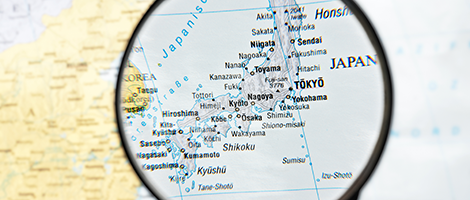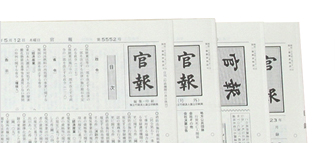


Early announcement of tenders is one of the voluntary measures taken by the Japanese government to facilitate access for foreign companies in the Japanese public procurement market. As early as possible at the beginning of the fiscal year, in the April-May period procurement of large-scale goods and services are publics in the “Kanpo” Government Gazette. Early announcement of tenders is largely limited to national government entities and affiliated organizations.
Kankouju or ‘Public Agency Orders’ relates to the budget of public procurement spending reserved specifically for SMEs. This earmarked budget is regulated by the Act on Ensuring Receipt of Orders from the Government and Other Public Agencies by Small and Medium-sized Enterprises established in 1966.
In fact, more than half of the tenders are reserved for SMEs. The Japanese government sets a target for each year, in FY 2013. 56% of the total expected demand of €61.7 billion was reserved for SMEs.
|
English language portals |
Japanese language portals |
|
Japan External Trade Organization (JETRO) Government Procurement Information Website |
Governments require a vast array of goods and services, to perform their duties, which makes it difficult to give a specific indication for specific products. Foreign companies are currently primarily active in the following sectors (value-based), but still have relatively small shares:
There are only a few comprehensive statistics available about public procurement in Japan, to obtain a good overview about how and where Japanese government institutions spend their money. Although various statistics can be found, they are difficult to compare as often different thresholds are applied when compiling the statistics. On this page you will find a selection of statistical resources regarding public procurement in Japan.
Reports by the Japanese government to WTO
The framework of laws, ordinances and regulations regulating Government Procurement is one of high complexity, involving dozens of legal texts. Procurement by national entities is subject to the Accounts Law; on the other hand procurement by local government falls under the Local Autonomy Law. This has resulted in the development of two separate legal structures government procurement.
Japan signed up to the World Trade Organisation Agreement on Public Procurement (GPA) in 1994, to create better opportunities for foreign companies in the signees’ respective countries. Concretely this means that country who joined the GPA take measures to ensure fair and equal treatment of suppliers irrespective of whether they are a domestically based company or based in one of the other signees’ countries.
Type of procedure | Occurrence | Tender size |
Common | Any | |
Rare | Any |

The Japanese public procurement (PP) market is one of huge potential, with EU-estimates ranging from EUR 550 billion to EUR 565 billion. EU-companies are relatively underrepresented in the PP-market in Japan, partly due to non-regulatory barriers and the geographical distance and lack of knowledge of the market. EU companies that are presently active in this market are primarily larger global players, with a sizeable presence in Japan.
The EU-Japan Centre currently produces 5 newsletters :










Joint venture established in 1987 by the European Commission (DG GROW) and the Japanese Government (METI) for promoting all forms of industrial, trade and investment cooperation between the EU and Japan.
The EU-Japan Centre’s activities are subject to the allocation of a Grant Agreement by the European Commission for 2024-2026

